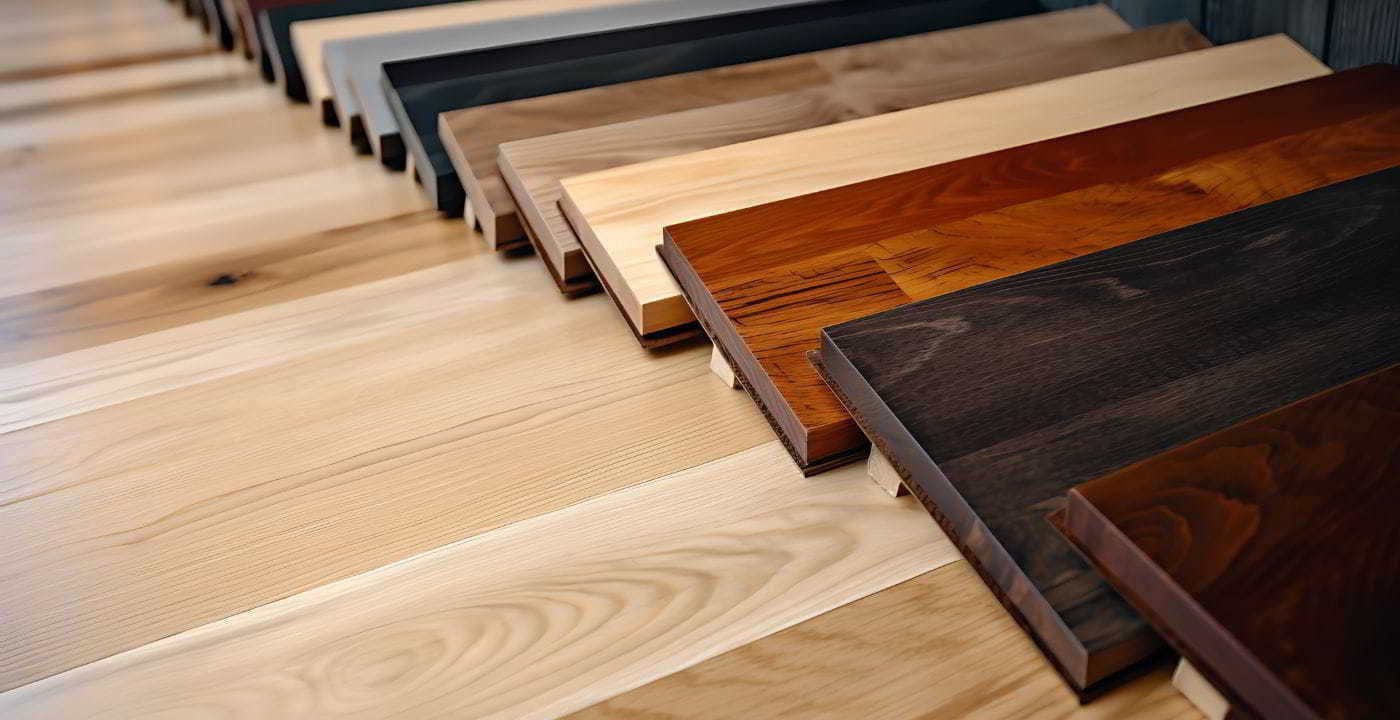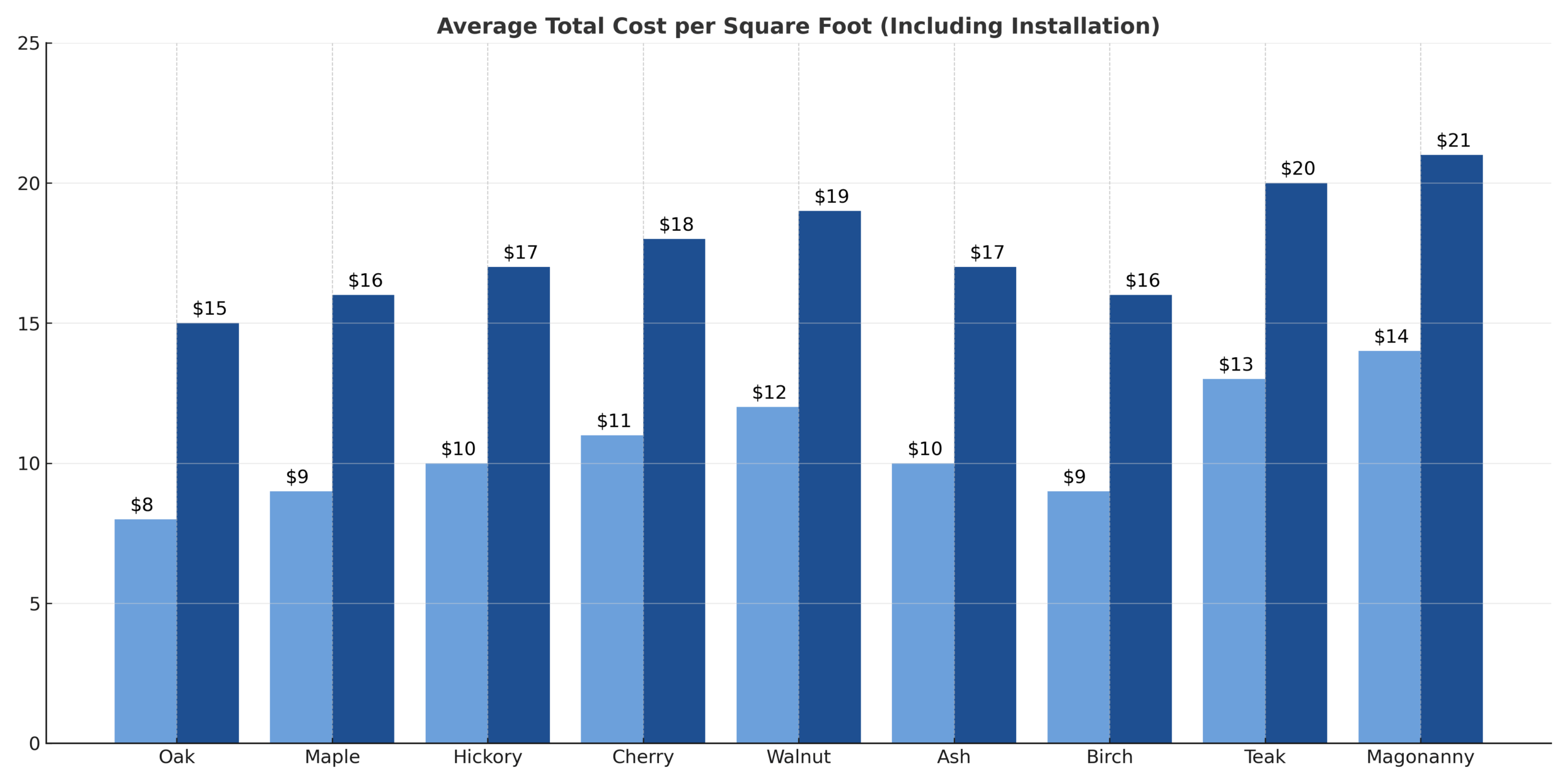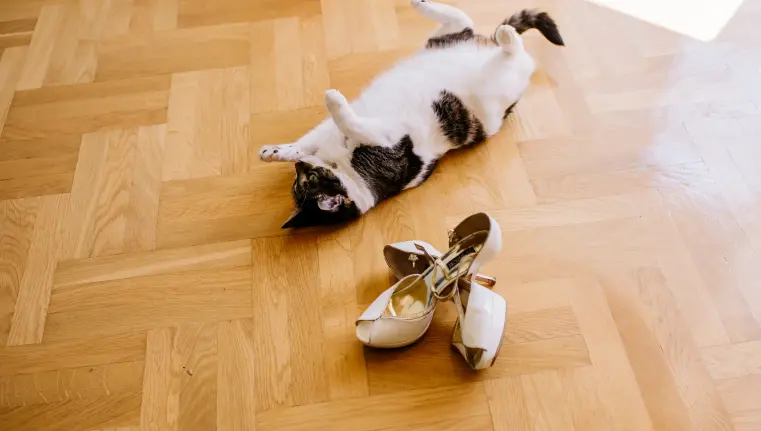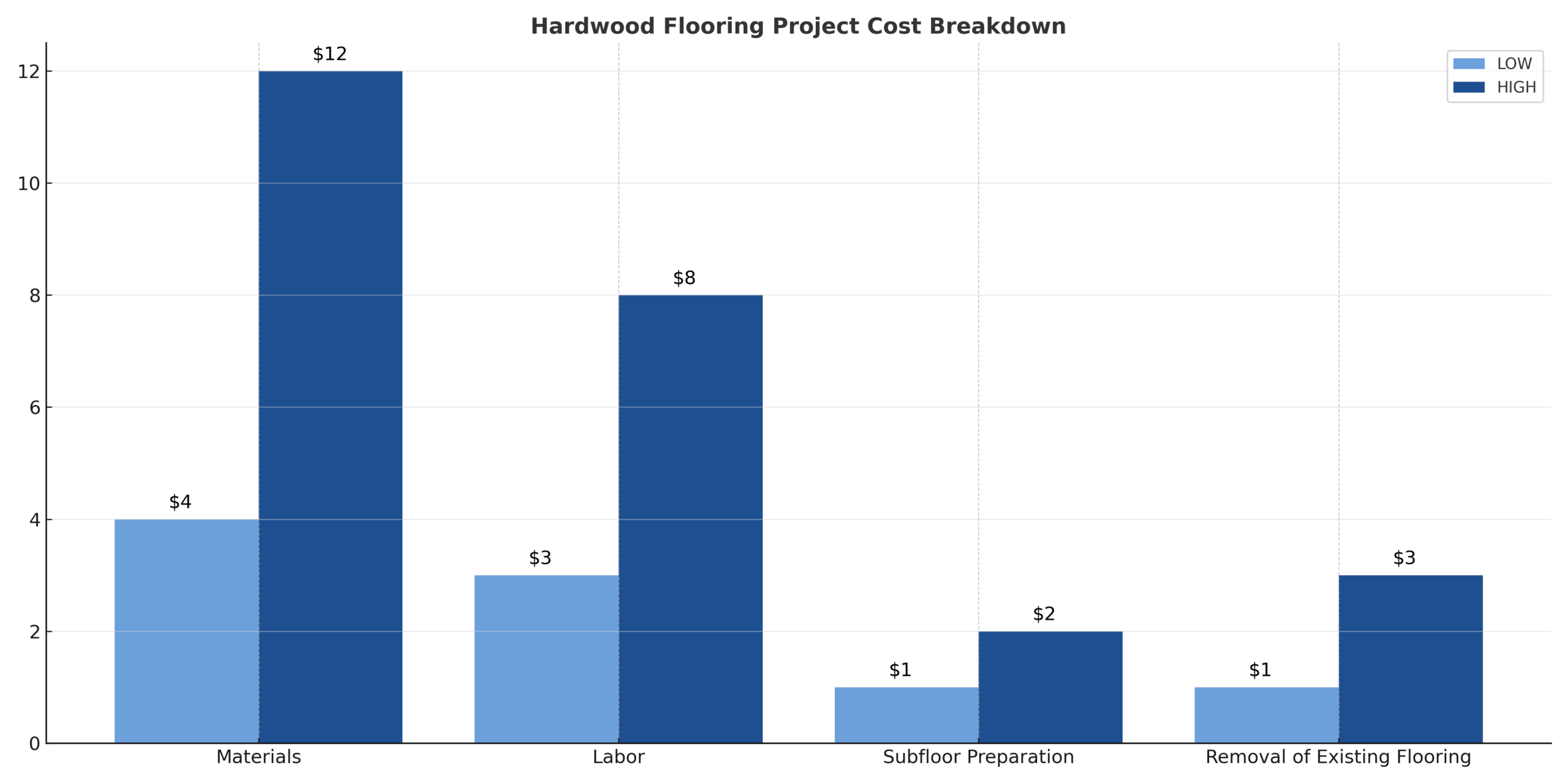
Hardwood Flooring Cost Breakdown
Here’s a quick look at the cost per sq ft:
| Size by Square Feet | Low-End Estimate | Average Cost | High-End Estimate |
|---|---|---|---|
| 500 | $3,000 | $7,750 | $11,500 |
| 1,000 | $6,000 | $14,500 | $23,000 |
| 1,500 | $9,000 | $21,750 | $34,500 |
| 2,000 | $12,000 | $29,000 | $46,000 |
| 2,500 | $15,000 | $36,250 | $57,500 |
| 3,000 | $18,000 | $43,500 | $69,000 |
Materials: $4 to $12 per square foot
The type and quality of hardwood flooring can change how much a project costs. Options include common oak and maple and special kinds like Brazilian cherry and teak. Each has its own features and prices.
Domestic Hardwood
Domestic hardwoods like oak, maple, and hickory are easy to find and usually cost $4 to $8 per square foot. These woods are durable and flexible, making them favorites for many homeowners.
Exotic Hardwood
Exotic hardwoods like Brazilian cherry, teak, and mahogany have unique patterns and colors. They cost more, from $8 to $12 per square foot, but many people like their special look.
| Hardwood Species | Average Cost per Square Foot (Materials Only) | Average Total Cost per Square Foot (Including Installation) |
|---|---|---|
| Oak | $4 – $8 | $8 – $15 |
| Maple | $5 – $9 | $9 – $16 |
| Hickory | $6 – $10 | $10 – $17 |
| Cherry | $7 – $11 | $11 – $18 |
| Walnut | $8 – $12 | $12 – $19 |
| Ash | $6 – $10 | $10 – $17 |
| Birch | $5 – $9 | $9 – $16 |
| Teak | $9 – $13 | $13 – $20 |
| Mahogany | $10 – $14 | $14 – $21 |

Labor: $4 to $8 per square foot
Labor expenses can be a big part of the total cost. Professional installation makes sure hardwood floors are placed and finished right for a perfect look.
Labor costs usually cover putting down the flooring and getting the subfloor ready.
Installation
Hardwood floor installation needs skill for a smooth look. Installers might charge $4 to $8 per square foot for labor, based on project details and local rates.
Finishing
Labor costs might also include services like sanding and sealing the floors to make them look good and last longer.

Subfloor Preparation: $1 to $2 per square foot
Getting the subfloor ready is important for making hardwood floors last and stay stable. This means fixing uneven areas, repairing damage, and setting up moisture barriers.
Leveling
If the subfloor is not smooth or has damage, leveling might be needed for a good hardwood installation. Leveling usually costs $1 to $2 per square foot, based on the work needed.
Moisture Protection
Moisture can harm hardwood over time, so a moisture barrier is key, especially in wet areas. The cost for installing a moisture barrier is usually between $1 and $2 per square foot.
Removal of Existing Flooring: $1 to $3 per square foot
Before putting in new hardwood floors, old floors like carpet or laminate might need to be taken out. This makes a clean, flat surface for the new floors.
Carpet Removal
Taking out carpet usually costs $1 to $2 for each square foot. The cost depends on the carpet type and if there’s padding underneath.
Tile or Laminate Removal
Taking out tile or laminate might need more work and tools. This can make the cost higher, from $2 to $3 per square foot.
Summary of hardwood flooring cost breakdown:

Solid Hardwood Flooring Installation
Solid hardwood flooring is known for its classic look and strength. Installing it usually costs between $11 and $25 per square foot, covering both materials and work.
The price can change based on the wood type, how hard the job is, and any extra services needed.
Installation Method
How the flooring is installed also affects the cost. Traditional nail-down installation usually costs less than glue-down or floating methods.
Additional Services
Sometimes, extra services are needed when installing solid hardwood flooring, which can change the cost. This includes getting the floor ready, like leveling or adding a moisture barrier, to make sure the result lasts long.
Staining or finishing the floors might cost more but can make them look better and last longer.

Engineered Hardwood Flooring Installation
Engineered hardwood flooring is a stable and flexible option that many people like. The cost for putting in engineered hardwood usually ranges from $7 to $20 per square foot, including both materials and labor.
Using special woods or finishes might make it more expensive. Thicker wood veneers are also pricier.
Installation Method
The way you install engineered hardwood can change the cost. Floating installations, where the planks aren’t stuck to the floor, are often faster and cheaper than glue-down or nail-down methods.
If the installation is complicated, like over heated floors or uneven surfaces, it might cost more.
Factors that Affect Hardwood Flooring Costs
| Cost Factor | Details |
|---|---|
| Wood Type | Different types of hardwood floors have different prices. Common ones include oak, maple, cherry, and walnut. Exotic types like Brazilian cherry or teak cost more. |
| Wood Quality | Wood quality affects price. Engineered hardwood is usually cheaper than solid hardwood but looks similar. |
| Installation Method | Installation affects cost. Nail-down and glue-down methods are usually cheaper than floating floors. |
| Room Size | Bigger rooms need more materials and work, making them cost more. |
| Subfloor Condition | If the subfloor needs fixing or leveling, it will add to the cost. |
| Additional Features | Extras like borders, inlays, or custom designs can make it cost more. |
| Additional Services | Extra services include removing old floors, leveling subfloors, changing underlayment, or adding baseboards. |
Professional vs DIY Flooring Installation
When it comes to laying hardwood floors, people can hire experts or try a do-it-yourself job.
Each choice has its pros and cons. Knowing these can help people decide what fits their budget, skills, and needs.
Professional Installation
Advantages
- Expertise: Professionals have the skills and experience for a good floor installation.
- Efficiency: They use special tools to finish the job fast and on time, reducing mistakes.
- Warranty: Many offer guarantees on their work, ensuring any problems are fixed for free.
- Professional Finish: They handle details like sanding and sealing for a perfect look.
Drawbacks
- Cost: Hiring pros costs more upfront than doing it yourself.
DIY Installation
Advantages
- Save money: DIY saves on labor costs, especially for small areas.
- Flexibility and control: Work at your own pace and make changes as needed.
- Learn new skills: Gain useful experience along the way.
Drawbacks
- Risks mistakes that can affect the quality, like uneven boards.
- Demanding and time-consuming: Involves heavy work and long hours.
Ready to Turn Your Hardwood Flooring Vision Into Reality?
Picking hardwood flooring is important. Knowing the costs helps you get closer to your dream space. You don’t have to do it alone.
We can guide you with a free consultation from our flooring installation experts. Our team helps you choose wood types, understand installation, and plan your budget so you love your floors for years.
Contact us today to book your free in-home flooring consultation and check if we serve your area.





